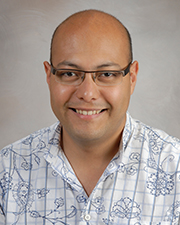New leadership for Pulmonary Center of Excellence

Harry Karmouty-Quintana, PhD, associate professor and fellow of the William S. Kilroy, Sr. Distinguished University Chair in Pulmonary Disease, has been appointed director of the Pulmonary Center of Excellence.
With faculty appointments in the Department of Biochemistry and Molecular Biology and the Divisions of Critical Care and Pulmonary and Sleep Medicine, Karmouty-Quintana is also the program director of the Biochemistry and Cell Biology Graduate Program at the MD Anderson UTHealth Graduate School of Biomedical Sciences.
The PCOE was established in 2015 by Michael R. Blackburn, PhD, who retired in 2022 as executive vice president and chief academic officer of UTHealth Houston. Karmouty-Quintana was appointed director of PCOE effective July 2022.
The mission of the PCOE is to harness basic, clinical, and translational research disciplines across UTHealth Houston to advance our understanding of pulmonary diseases and to identify novel treatment options.
“Current research projects focused on emphysema, lung fibrosis and pulmonary hypertension. A focus of the center is to understand the mechanisms that lead to lung rejection after transplantation,” Karmouty-Quintana said.
The center is home to the lung tissue biorepository, which was established in 2011. It contains over than 500 unique lung specimens. The biorepository includes explanted lung tissue samples from patients with emphysema, pulmonary hypertension, and lung fibrosis and also houses primary cells isolated from control or diseased lungs, including lung epithelial cells, endothelial cells, fibroblasts, vascular smooth muscle cells, and single cell lung suspensions.
In addition to the lung tissue biorepository, the PCOE boasts a pre-clinical research cardiopulmonary suite, which includes a system capable of measuring lung function changes in experimental models of disease used to test the efficacy of new drugs to treat asthma, emphysema, and lung fibrosis.
“We must break the walls that keep translational researchers working in silos and understand that sharing our resources is the only way forward to fight lung diseases,” Karmouty-Quintana said.
Karmouty-Quintana and his PCOE colleagues including Drs, Bindu Akkanti, Soma Jyothula, and Manish Patel have recently published translational research milestones in high-impact journals, including the identification of role of a novel transcription factor Six1 in lung fibrosis, a devastating disease with limited treatment options outside lung transplantation.
In another recent paper, the lab identified 3’UTR shortening of hyaluronan synthase 2 (HAS2) as a novel mediator in pulmonary arterial hypertension, a disease that disproportionately affects young women.
A recent paper also identified fulminant lung fibrosis in non-resolvable COVID-19, representing and aggressive complication of COVID-19 that requires lung transplantation.